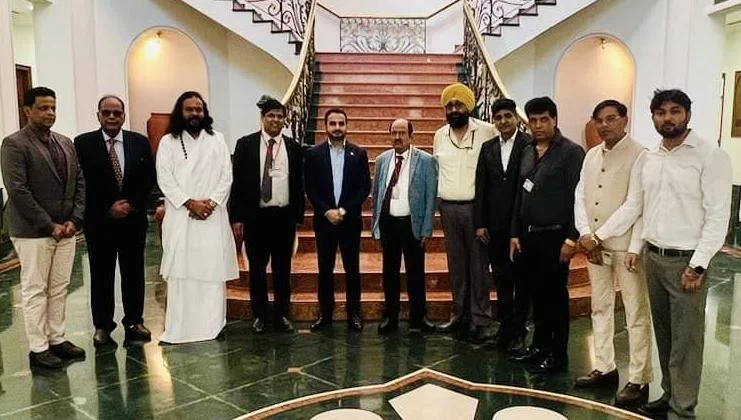New Delhi, India — In a significant move to bolster educational ties between India and the Sultanate of Oman, Professor Dr. K.S. Rana, the newly appointed Honorary Trade Commissioner of the India-GCC Trade Council, is set to spearhead initiatives aimed at fostering academic collaborations between the two nations. This initiative is seen as a crucial step in strengthening bilateral relations, with a focus on knowledge exchange and academic growth.
Strengthening Bilateral Relations through Education
The India-GCC Trade Council recently organized a UN South-South Cooperation meeting in New Delhi, which witnessed participation from ambassadors and diplomats representing various countries, including Oman. The gathering highlighted the need for deeper international cooperation and mutual understanding. During the event, discussions centered on creating synergies in trade, technology, and education to enhance relations between India and Gulf Cooperation Council (GCC) countries. In this context, Professor Rana’s role in initiating and facilitating educational collaborations was widely appreciated.
Professor Rana’s Vision for India-Oman Educational Collaborations

Professor Rana envisions a comprehensive framework where Indian educational institutions collaborate with their Omani counterparts to exchange knowledge, research, and best practices. His proposal focuses on joint research projects, faculty exchanges, and cultural immersion programs that not only promote academic growth but also strengthen cultural understanding between the two nations. By leveraging the strengths of both countries, the aim is to create a symbiotic relationship that benefits students, educators, and researchers alike.
According to Professor Rana, “Education is a bridge that connects cultures, and through these collaborations, we aim to nurture a generation that respects diversity and understands the global challenges of our time.” His statement underscores the broader purpose behind these efforts — to not only enhance academic standards but also to cultivate a spirit of mutual respect and global citizenship among the youth.
Leveraging Professor Rana’s Academic Expertise
With a distinguished career spanning over four decades, Professor Rana has held several prestigious positions in India’s higher education sector. He has served as the Vice-Chancellor of Mewar University in Chittorgarh, Rajasthan, Kumaun University in Nainital, and Nalanda State University in Patna. Known for his expertise in environmental science and sustainable development, his extensive research has been published in reputed journals globally.
His experience as a leader in academia has equipped him with a deep understanding of the educational needs and aspirations of students and institutions. This background allows him to navigate complex administrative dynamics, bridge cultural differences, and create pathways for constructive dialogue. Professor Rana believes that the collaboration with Omani institutions could serve as a model for similar initiatives across the GCC region.
The Role of the India-GCC Trade Council
The India-GCC Trade Council has been instrumental in facilitating trade, technology transfer, and educational exchanges between India and the GCC countries. By appointing Professor Rana as the Honorary Trade Commissioner, the council aims to strengthen its outreach in the education sector. The council envisions creating a sustainable ecosystem where institutions from both regions collaborate seamlessly, paving the way for impactful research, innovative educational practices, and policy advocacy.
A senior representative of the council remarked, “Professor Rana’s experience and vision make him an ideal leader to steer this initiative. His understanding of international education systems and his commitment to fostering cross-cultural ties will help us achieve our goal of a more interconnected academic community.”
Anticipated Impact on Students and Educators
The proposed collaborations are expected to open new avenues for students and educators in both countries. Students will have the opportunity to experience diverse learning environments, benefit from innovative teaching methodologies, and participate in international conferences and workshops. Additionally, collaborative research initiatives will allow students to work on projects addressing global challenges such as climate change, public health, and sustainable development.
For educators, these collaborations present opportunities for professional development, joint publications, and exposure to global best practices. Faculty exchanges can lead to curriculum development that integrates international perspectives, making education more relevant and dynamic.
Potential Challenges and the Way Forward
While the proposed collaborations hold great promise, there are potential challenges to address. Differences in educational systems, language barriers, and varying accreditation standards may pose initial difficulties. However, Professor Rana is optimistic that with effective planning, these challenges can be navigated. He suggests the establishment of a joint task force comprising representatives from both nations to oversee the implementation of collaborative projects and ensure quality standards.
The Path Ahead: Building a Global Knowledge Network
Professor Rana’s initiative has the potential to not only strengthen bilateral relations between India and Oman but also contribute to a more interconnected and inclusive global knowledge network. By building bridges across borders, this collaboration aims to prepare future leaders who are culturally aware, globally competent, and equipped to tackle the pressing issues of the 21st century.
As plans materialize and collaborations take shape, the academic community eagerly anticipates the positive outcomes that will arise from this endeavor. The impact of this partnership could extend beyond academia, influencing policy-making, trade relations, and cultural exchange between India and the Sultanate of Oman.
In a rapidly globalizing world, educational collaborations like these serve as a testament to the power of learning as a tool for diplomacy and development. As Professor Rana and the India-GCC Trade Council work toward realizing this vision, the world watches with hope for a future where knowledge knows no borders.



